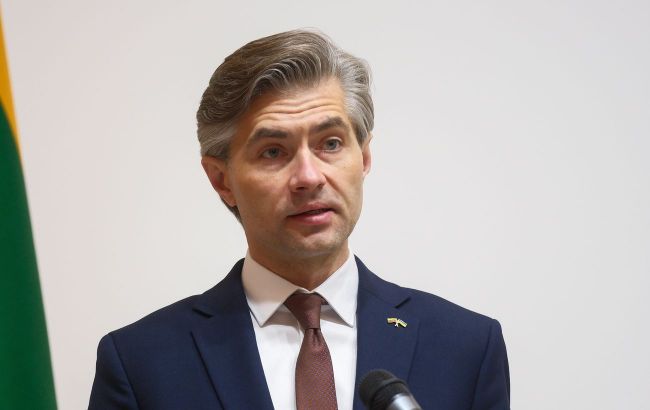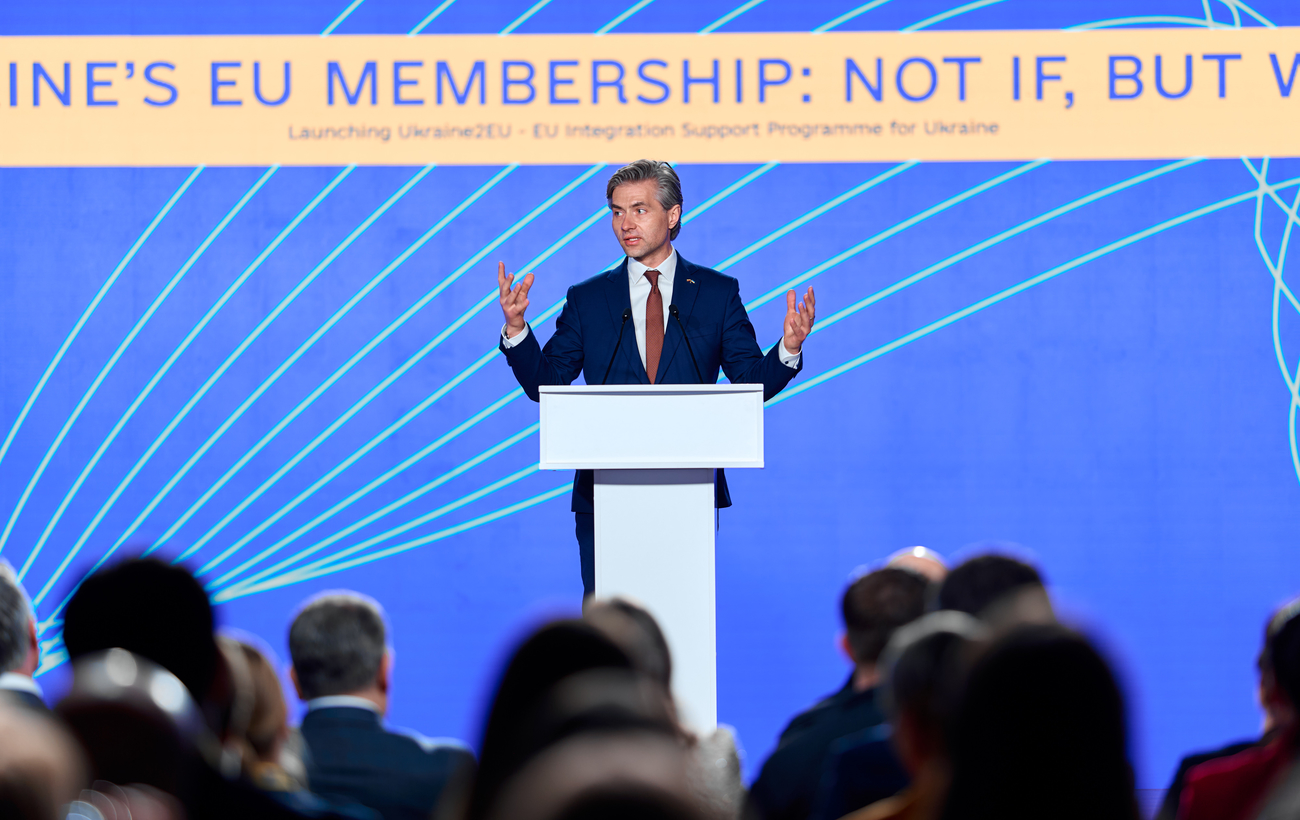Kęstutis Budrys, Lithuanian FM: 'Russia wants to subjugate neighboring countries while Putin is in power'
 Kęstutis Budrys, Lithuanian Foreign Minister (Photo: Vitalii Nosach, RBC-Ukraine)
Kęstutis Budrys, Lithuanian Foreign Minister (Photo: Vitalii Nosach, RBC-Ukraine)
In an interview with RBC-Ukraine, Lithuanian Foreign Minister Kęstutis Budrys shared his views on peace negotiations and the role of the US, Europe's security in the new realities, European aid to Ukraine, the Russian threat to the Baltic countries, and Ukraine's EU membership.
"On January 1, 2030, you can become a member of the European Union – and this can be achieved," said Lithuanian Foreign Minister at the opening of the Ukraine2EU project in Kyiv, drawing applause from the audience.
Ukraine2EU is a program initiated by the EU, Lithuania, and Denmark (later joined by Sweden), aimed at helping Ukraine complete its path to full EU membership.
Beyond supporting this strategic goal, Lithuania has been actively assisting Ukraine since the first day of the full-scale invasion. According to estimates from the Kiel Institute for the World Economy, Lithuania has allocated aid to Ukraine amounting to 1.8% of its GDP – ranking third among all of Ukraine’s partner countries worldwide.
In a conversation with RBC-Ukraine before the conference, Budrys noted that not all European countries are increasing their defense spending and making long-term commitments to support Ukraine like Lithuania. Therefore, he said, "We still have to ring this bell and take the bucket of cold water to the beds where someone is warmly sleeping."
Regarding the main topic of recent months – peace negotiations – the Lithuanian Foreign Minister insists that Russia never acts out of goodwill, only under pressure from sanctions, economic restrictions, and firm military force. "If this will be the first time in history that Russia behaves with the different approach, I would be really surprised," Budrys said. Thus, he suggests giving the Americans time for their diplomatic efforts and seeing whether "Russia is the same as we have known it for hundreds of years."
— Nowadays, the central topic in the context of the war in Ukraine is the peace negotiations and different attempts to achieve at least some kind of ceasefire. Do you see at least some signs that Russia may agree to a ceasefire in the foreseeable future? Any signals from them?
— We haven't seen Russia agreeing to anything on the goodwill and only through the nice process where each party gives to the some incentives. Because Russia is not that type of negotiator, and it's not that type of international actor.
In the current situation, Lithuania is well aware that it's an aggressor and that the war that Russia started was illegal, and that's how Russia has to be addressed. That's from the position of right and position of strength, and this is the proper way to achieve just and long-lasting peace. Lithuania is not a neutral country just watching from the aside. We are very much in support of Ukraine and your efforts to protect and defend yourself for the bright future of the country.
So talking about Russians, we believe in those measures that we've seen historically that worked, and we have the precedents that worked, that's the hard military power, that's the use of economic restrictive measures, that's sanctions and that's also the using as a leverage the seizing of frozen assets. And if this will be the first time in history that Russia behaves with a different approach, I would be really surprised.

Kęstutis Budrys at the Ukraine2EU conference (Photo provided by the organizers)
— How would you assess the United States' activity in the context of peace negotiations and the fact that the United States publicly positioned itself as a mediator between Ukraine and Russia and not as an ally of Ukraine as it used to be before that?
— We commend the efforts of President Trump's administration to try the maximum out of the diplomatic track and diplomatic instruments. We want to see them backed with hard instruments and hard leverages towards Russia when or if Putin does not show the willingness to end the aggression and to agree to the terms of a ceasefire.
So we do credit for that, and only after this process will we be able to assess overall whether the US was in the middle, whether the US was with Ukraine, or even on the other side. Let's give them a go with the diplomatic efforts and see whether Russia is the same as we have known it for hundreds of years.
— Taking into account the recent statements and actions by President Trump, is it fair to say that nowadays, Europe's security is Europe's own business? And do you see that Europe has woken up after J.D. Vance's speech at the Munich conference, after that notorious scandal in the Oval Office, after President Trump's statements, and realized that it's necessary to immediately take care of its own security.
— There were reasons for Europe to wake up after the full invasion of Ukraine. When we saw the status of our stockpiles, reserves, and our own military capabilities, we had to rely on US leadership and US resources for a reason because Europe doesn't have one.
And yes, we sent the good part of it to Ukraine, but it's not enough for Ukraine; it's not enough for Europe's defense. So, I cannot agree that the reason for my waking up was the elections in the United States. That's Russia, the reason to wake up.
And we are not doing enough yet. When I'm talking about Lithuania, we're doing a lot. We're increasing our defense spending. We committed to Ukraine for decades with our support, our partners in the region doing the same, but not all in Europe. We still have to ring this bell and take the bucket of cold water to the beds where someone is warmly sleeping. And in doing this, of course, we have to keep Americans in the deterring of Russia and within the defense planning of the Euro-Atlantic area, because it's also their area.
— Do you think it's possible to keep them in?
— I do not have the signs that they won't be, that they are not the part of the NATO alliance that is based on one thing, trusting each other, that we will defend each other in the case of war. Yes, we see different processes and the review of the posture in Europe, as in the continent. Some of it is for a natural process and I wouldn't now trust that they will be not politically with us. As I have reason to believe that the US will remain part of the European security architecture. Also, with Ukraine being part of it. Because what I cannot see in the future, I cannot see the future of European security without Ukraine. That will be the very critical part of it, and that's why it's Lithuania's national interest to have you safe, to have you strong, and to have you within the European Union.
— As of now, to what extent is Europe able to compensate Ukraine for possible interruptions in the flow of military aid from the US?
— There are some critical supplies that we do not have a substitute for, and we all know what they are. This is the reason why we have to continue cooperating with the US. Another thing is that we have to cooperate more between the EU and Ukraine as the future member state of the EU within the defense industry. Lithuania has already invested in the defense industry of Ukraine and we are looking for collaboration and cooperation projects between our companies. I believe that we will be stronger with our own production and there will be no gaps uncovered between Ukraine and Europe in what we produce. That's our target.

EU Ambassador to Ukraine Katarína Mathernová, Deputy Prime Minister Olha Stefanishyna, Kęstutis Budrys (photo provided by the organizers)
— Recently, the Financial Times published an article stating that in the event of the ceasefire in Ukraine, the threat to the Baltic nations, in particular Lithuania, from Russia, will become higher as Russia will be able to transfer its troops that it will release here in Ukraine to your region, closer to your borders. Do you agree with such an opinion, and how do you assess the risk of Russia's invasion of the Baltics in the foreseeable future?
— Russia has been a direct military threat for years to the Baltic countries. And it's not all about the level of threat, it's about the level of our resilience and level of our capabilities to deter, meaning to defend ourselves. So it is interrelated when we assess the risk, not only the threat. The part of the threat is divided into capabilities and intents. And I have no doubts about Russia's intents. They are still there. They want to subjugate the neighboring countries. And it will remain while Putin is in power. And there is the question of capabilities. So now they are within the Ukraine and next to Ukraine. Of course, they will be redeployed to the bases where they came from.
So, when we count capabilities, in the future it will be increased in our direction. But it's in Russia's planning that we're interconnected, and it's in our defense planning also we see us interconnected. So it won't be like one is the target, and another is left aside. So we will be the one long front line and we have to plan for it, that we will be one long front line that we have to defend ourselves.
— Will Ukraine be able to complete its path to full-fledged membership in the EU till 2030, or maybe it has to be earlier?
— That's the deadline. We have to set the deadline and count clockwise, count it back with all the other deadlines for the important decisions to be made. Lithuania is investing our very best expertise and knowledge from our accession process with this beautiful and wonderful project that we are launching today. We believe that you can make it till 2030. That's why we are so dedicated, because you are inspiring us with your dedication and motivation.

